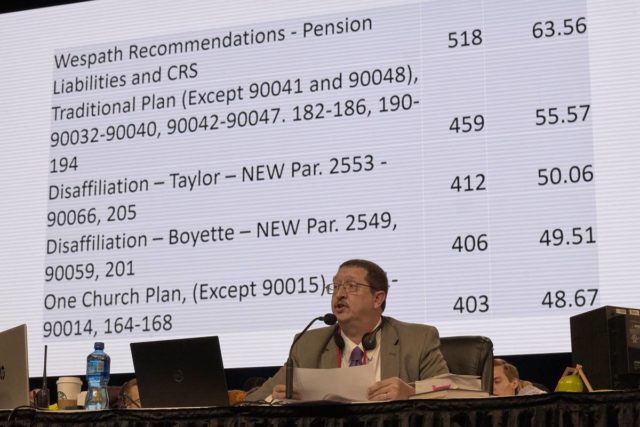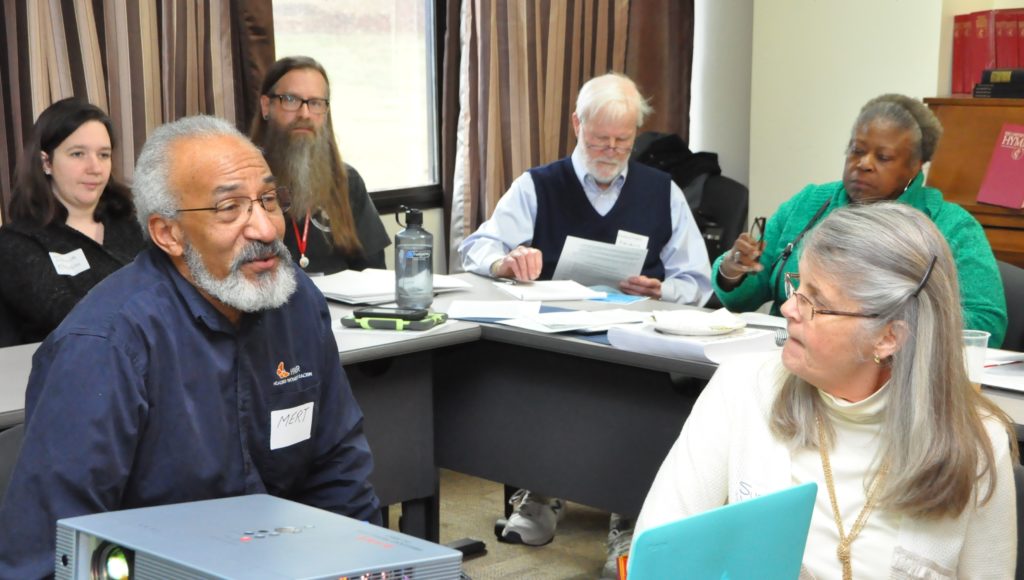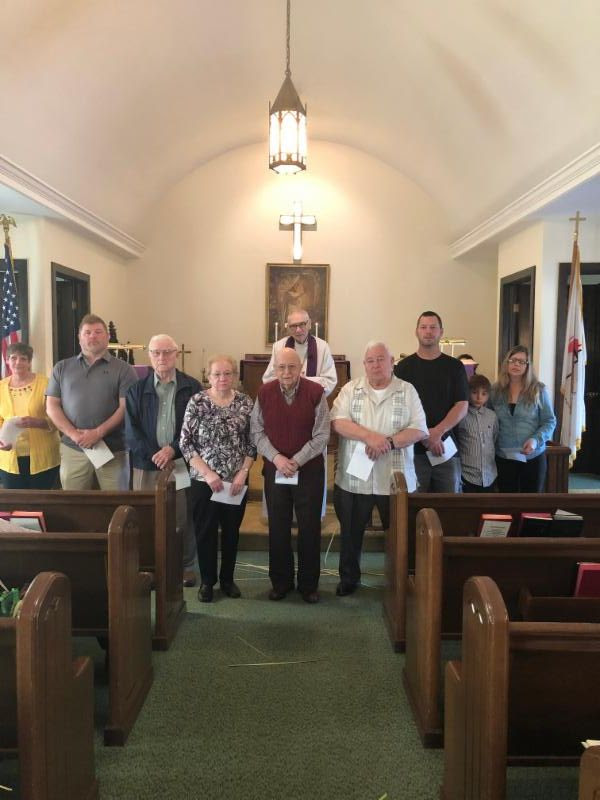 The big screen on the first night of General Conference 2019 shows delegates' preferences for which pieces of legislation to consider first. The top three vote-getters--Wespath's pension modification plan, the Traditional Plan and the Taylor Disaffiliation Plan--all passed as amended and will impact the 2019 Eastern PA Annual Conference. UMNS photo
The big screen on the first night of General Conference 2019 shows delegates' preferences for which pieces of legislation to consider first. The top three vote-getters--Wespath's pension modification plan, the Traditional Plan and the Taylor Disaffiliation Plan--all passed as amended and will impact the 2019 Eastern PA Annual Conference. UMNS photo
BY JOHN W. COLEMAN
The 2019 Eastern PA Annual Conference (AC2019), meeting June 13-15, will consider 19 legislative resolutions for debate and votes among its membership. Two resolutions submitted in May, after the March deadline, were prompted by decisions of the denomination’s recent Special General Conference and Judicial Council that temporarily allow churches to leave the denomination for doctrinal reasons and to take their properties with them.
Those pivotal decisions suspend until December 2023 the protective trust clause, which is found in the UMC’s Book of Discipline, and thus, allow churches to disaffiliate with their assets from the denomination in disagreement with church law and doctrine regarding homosexual clergy and same-sex marriage. The Special General Conference in February passed the Traditional Plan that retains and more strictly enforces bans against lesbian and gay members being included in United Methodist weddings and ordained ministry. That vote may be sustained or overturned at the 2020 General Conference.
The new disaffiliation rules relate to church properties and clergy pensions. Exiting churches may retain their properties under certain conditions and in compliance with annual conference policies and protocols, but they must satisfy prescribed clergy pension obligations.
The Eastern PA Conference Board of Trustees, in Resolution 2019–19L, proposes that new disaffiliation guidelines in paragraph 2553 of the Book of Discipline temporarily supersede different rules approved by the 2015 Annual Conference (Resolution 2015-17) when it accepted terms of the disaffiliation of Wesley UMC Quarryville.
The Board of Pension and Health Benefits will present to the Annual Session Resolution #2019-18L, Pro Rata Pension Obligation, which requires compliance with the new ¶2553 of The Book of Discipline mandate that before any church disaffiliates from the UMC it must pay its “withdrawal liability in an amount equal to its pro rata share of any aggregate unfunded pension obligations to the annual conference.” That liability is determined by the church’s percentage of the Conference remittance figures for the year of disaffiliation. Funds paid must be used “solely for payment of future clergy pension obligations.”
“It is my prayer that we will handle these resolutions with great care and listening hearts,” said Bishop Peggy Johnson.
Other resolutions will recommend changes ranging from new requirements for clergy anti-racism training to new retiree benefits and the closure of two churches.
Changes in anti-racism training program
The recently reconstituted Healing the Wounds of Racism (HWR) Core Accountability Team will present three resolutions, #2019-9, #2019-11 and #2019-15. The team was created by the 1996 Annual Conference as part of its “Plan toward the Elimination of Racism within the Eastern PA Conference.” With changes in conference staffing and anti-racism training programs, the HWR team has been minimally active in recent years, primarily consulting with and assisting the Commission on Religion and Race (CORR), its partner in dismantling systemic racism.

The Revs. Mert Shane (left) and Susan Worrell, co-leaders of Healing the Wounds of Racism (HWR) and the Commission on Religion and Race (CORR), respectively, have jointly led advanced anti-racism training classes over the past few years, offering an experimental follow-up to the required biannual Changing Racism workshop. Now Healing the Wounds, with a new board, is proposing to supervise introductory and advance training in this area and suggesting that both be mandatory for clergy and lay ministers. John Coleman photo
The three HWR resolutions propose that the newly reorganized team, which is co-chaired by the Revs. David W. Brown (Elder) and Mertice Shane (Local Pastor), provide oversight again to all required training to help clergy, lay ministers and conference staff understand and undo the sin and practice of institutional and interpersonal racism in their ministries.

Gene Washington and Sarah Stearns, two diversity and equity education consultants from Visions, Inc., currently teach the conference’s twice-yearly, introductory anti-racism training sessions, titled Changing Racism. HWR is helping them sharpen the program’s focus and proposes to oversee it and also take over CORR’s recent advanced anti-racism training program.
HWR further proposes to change the title of both programs to Dismantling Racism, to more accurately reflect the conference’s goals. And it asks the Annual Conference to “encourage the Board of Ordained Ministry to establish a requirement for advanced training in dismantling racism, similar to the requirement for advanced sexual ethics training.” (#2019-11)
The HWR team also asks to report on its work to the Director of Connectional Ministries, rather than to CORR (#2019-9).
Respect for Native American land rights
Another resolution addressing racial concerns is #2019-14, which calls upon the conference to advocate for protection and respect for Native American land rights based on treaties between Native tribes and the U.S. government.
“The greatest challenge facing Native Americans today is invisibility,” reads the resolution submitted by the conference Committee on Native American Ministries (CONAM). It notes the waning of public attention to ongoing, unsafe exploitation of Native land rights since the end of protests in Standing Rock, North Dakota, two years ago, that opposed installation of an oil pipeline there. Months after the Obama Administration halted the pipeline project, President Trump reversed that decision and permitted it to resume.

Citing the vulnerability of Native land rights to federally-aided multinational corporations and ongoing damage to land, water and air caused by pipelines and mining, the resolution asks the conference to publicly support the advocacy efforts of Native groups in the church and in society. It requests a signed copy of the resolution be sent to the White House and key leaders in Congress.
In other advocacy resolutions, #2019-10 asks the conference to revise the UMC’s longtime missional motto, for its own use, to “Open Bibles, Open Hearts, Open Minds, Open Doors” and to recommend that same extended motto to the denomination at the 2020 General Conference. The resolution, submitted by the Rev. Jimmy Montgomery and Cochranville UMC, cites the primacy of Scripture in our Wesleyan and former Evangelical United Brethren history, mission and doctrine, and it seeks to correct the omission of that primary influence from our UMC motto.
From “Mission ConneXion” to Mission Link
Resolution 2019-02 would officially change the name “Mission ConneXion,” coined by the Cabinet and Annual Conference in 2013 to describe organized clusters of neighboring UM churches working together in mission. The new, similar name proposed by the Cabinet for each cluster is “EPA Conference Mission Link.”
Groups of “Mission ConneXions” were formed among churches in each district to cooperate in creative mission projects. But it was recently discovered that the name was already copyrighted by a national mission training and support agency based in Oregon. Thus, the conference has agreed to stop all uses of the name and asked its districts and churches to do likewise to avoid any costly legal challenges.
Meanwhile, Resolution 2019-13 calls upon the conference to affirm itself as a “One Church Plan Conference in spirit,” apart from the General Conference’s majority-vote choice of the Traditional Plan as the UMC’s disciplinary “Way Forward.” It cites the dramatic lack of consensus in that vote—especially among U.S. delegates—and the ongoing efforts of many progressive leaders to forge unity and inclusion despite the global denomination’s current divisiveness and its exclusion of homosexual members from marriage and ordained ministry.
The resolution’s co-presenters, the Revs. James McIntire and Lydia Munoz, ask the conference to commit to “continued support of ministry to, for and with all persons, regardless of sexual orientation or gender identity.”
Licensed Local Pastors who have not completed the course of study and Commissioned Provisional Elders and Deacons who have not yet completed seminary training are two other groups that have long sought more inclusion. The Book of Discipline does not allow those two groups to be elected as delegates at our quadrennial conferences, nor to vote on constitutional amendments.
Resolution #2019-17, presented by the Revs. Jason Perkowski and Kevin Kresge, both local pastors, asks the Annual Conference to affirm changes proposed to grant rights to elect and serve to all Local Pastors, Provisional clergy and also student pastors. The changes would be made to the UM Constitution and Discipline at the 2020 General Conference.
Two closed churches to be discontinued
Meanwhile, the Annual Conference will vote to discontinue two churches that have voted to cease operating their ministries and close their doors.
CC Hancock UMC, South District, has served the community of Springfield, Pa., since its founding in 1956. It voted March 10 to discontinue its ministries and transfer members to Lima UMC. Proceeds from the sale of its property will go to support a new church extension ministry of St. Daniel’s UMC in Chester and to other church development efforts of the conference.


Members of the recently closed Diamond UMC in Hazelton were received into membership at Lattimer Mines UMC on April 4.
In addition, Diamond UMC in Hazleton, North District, established in 1905, voted to close Nov. 1, 2018, and held its last service on Sunday, Jan. 6. Any net assets remaining from its sale will go to Pocono Plateau and Gretna Glen camp and retreat centers and to ministries of its district.
Four resolutions pertain to conference pension benefits and policies and to health care insurance and rental/housing allowances for retired and disabled clergy. While Resolutions #2019-05 and -07 seek customary annual approvals, two other resolutions request important changes in pension and retiree health benefits services.
Resolution #2019-04 seeks to make enrollment in the Clergy Retirement Security Plan (CRSP) automatic, with a minimum 1% contribution to the UM Personal Investment Plan (UMPIP). Optional enrollments have led many clergy to delay their participation, thus minimizing their contributions and earning potential, and making them less prepared for timely retirement. Clergy may waive automatic enrollment if they wish.

Resolution #2019-06 seeks approval to outsource retiree health care to Via Benefits through Wespath, the denomination’s benefits and health care agency. The Via Benefits program helps eligible retirees, spouses and disabled participants efficiently select the best Medicare supplemental health coverage for their needs. The resolution would require use of Via Benefits and a reduction in the stipend paid to retirees.
Resolution #2019-03 asks the Annual Conference to offer a reduced conference registration fee for retired clergy not serving a sponsoring local church or church agency, since they have to pay their own registration costs, often while living on fixed incomes. The resolution, submitted by the Rev. Bron Yocum, also asks that the fee not exceed the cost of meals at the session.
Resolution 2019-08 would disband the Joint Committee on Incapacity, which no longer has responsibility to approve clergy medical leave, and instead form a Joint Caring Committee to “provide support, advocacy and contact for our members on medical leave.”
Five resolutions in all (#s 5, 6, 7, 12 and 16) will be placed on the Consent Calendar to be voted on together by consensus, unless requests are made to remove any from that group. One such resolution, #2019-12, is for approval of the 2019-20 Advance Special Applications by 10 diverse, local ministries seeking allowance to solicit local church second-mile-giving support.
And Resolution #2019-16 requests approval of recommended Equitable Compensation levels for 2020 to help economically challenged churches ensure that their pastors can receive at least minimal compensation.
All 19 resolutions can be found on the Conference website’s Annual Conference 2019 page, titled 2019 Resolutions.
